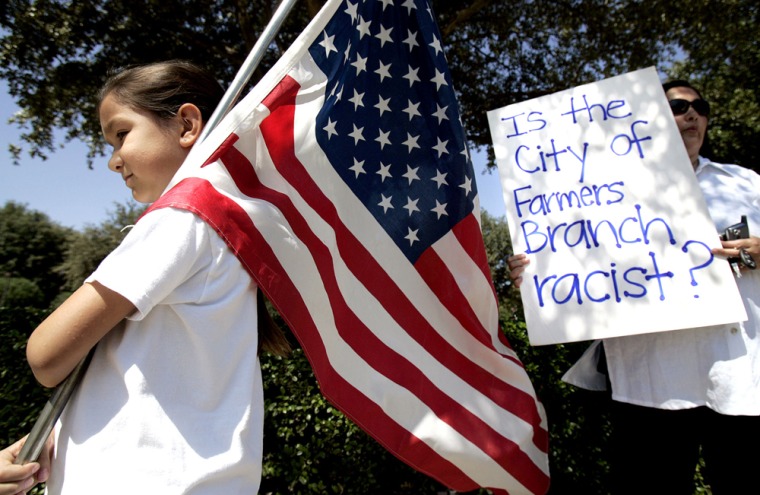Leaders of this Dallas suburb unanimously approved tough new anti-immigration measures Monday evening, including one that makes English the official language.
In a series of 6-0 votes, the city council without discussion approved fines for landlords that deal with illegal immigrants, and decided to allow local authorities to screen suspects in police custody to see whether they are in the country illegally.
With the votes, the city became the first municipality in Texas to enact such strong anti-immigrant laws. Such ordinances have troubled many people in the state, where many Latino families can trace their roots to the era before statehood.
More than 50 municipalities nationwide have considered, passed or rejected similar laws.
In a packed room in City Hall, people clapped as the votes were tallied in favor of the measures. In a parking lot outside, hundreds of protesters against the rules hoisted U.S. flags and recited the Pledge of Allegiance in English before the votes were taken.
The vote came after council members emerged from an all-day closed meeting with the city attorney in which they discussed the legal ramifications of the proposals. Opponents submitted an 80-signature petition to the mayor’s office Monday.
“It’s very much against the very fiber of this nation,” said Mike Ghouse, a homebuilder with a group called Foundation for Pluralism.
Council member Bill Moses blamed what he called inadequate federal law for forcing their vote.
“I’m just sorry that the federal government has put us in this position,” he said.
Attorneys with the Mexican American Legal Defense and Educational Fund met with the council during the closed meeting. Afterward, they said they had told council members the proposals, if approved, could violate federal law.
The rules could force untrained business owners and landlords to evaluate a wide array of immigration documents to determine whether the person carrying them is legally in the country, said Marisol Perez, a staff attorney for the group.
“You’re putting them in the shoes of an immigration officer,” she said she told council members.
The local debate over illegal immigration began in August and spawned demonstrations by both sides.
Supporters say the ordinances are necessary because the federal government has failed to address problems tied to illegal immigration. But critics argued the proposals could lead to sanctioned discrimination and racism.
Since 1970, Farmers Branch has changed from a small, predominantly white bedroom community with a declining population to a city of almost 28,000 people, about 37 percent of them Hispanic, according to the census. It also is home to more than 80 corporate headquarters and more than 2,600 small and mid-size firms, many of them minority-owned.
The proposals follow a vote this year in Hazleton, Pa., to fine landlords who rent to illegal immigrants, deny business permits to companies that employ them and require tenants to register and pay for a rental permit.
However, a federal judge temporarily blocked enforcement of the Hazleton ordinance while he considers a lawsuit against the town by civil and immigrant rights groups.
